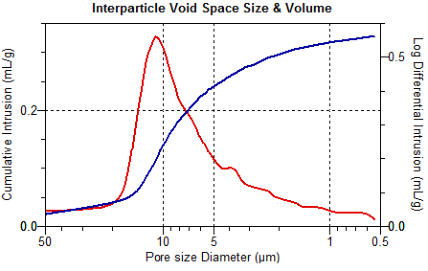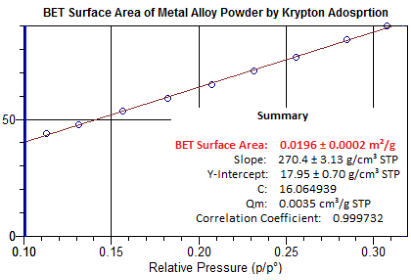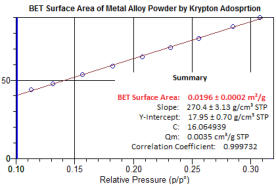




Expertise in the Physical
Characterisation of Materials

MCA Services
Unit 1A Long Barn, North End, Meldreth, Cambridgeshire SG8 6NT UK
01763 262333
© MCA Services




Additive Manufacturing / 3D Printing Materials
Additive
manufacturing,
also
known
as
3D
printing,
is
growing
at
an
amazingly
fast
rate
and
presents
exciting
new
opportunities
in
an
incredibly
diverse range of applications and industries.
The
porosity
of
raw
materials
significantly
influences
manufacturing
parameters:
the
size
and
volume
of
inter-particle
void
spaces,
related
to
particle
size
and
shape,
determine
the
physical
packing
of
a
powder
bed
and
In
turn,
this
will
determine
manufacturing
conditions
and
effect
the physical properties and appearance of finished articles.
Key Points:
•
Characterisation of raw materials to determine manufacturing conditions
•
BET Surface Area is critical to raw material specifications
•
BET Surface Area influences the sintering process
•
Determination of particulate void space and particle packing
•
Characterisation of finished pieces for porosity
•
Porosity effects mechanical strength, hardness and finish quality
•
Introducing porosity is necessary for reducing weight
•
Pore size and volume is critical to matching architectures & scaffolds
•
Porosity is also critical to the weight / strength balance
•
Assistance with data interpretation
•
Expansive data presentation and comparative overlay options
A
range
of
techniques
are
available
for
the
characterisation
of
both
raw
materials
and
finished
articles
and
these
can
be
applied
to
a
very
wide
range
of
materials:
including
thermo-plastics,
metals,
alloys,
glass
and
biomedical
materials.
BET
Surface
Area
can
be
applied
to
the
determination
of
printing
conditions
as
it
influences
particle
sintering.
Many
materials
used
in
additive
manufacturing
are
of
low
surface
area,
such
as
thermoplastics
and
metal
powders,
and
at
MCA
Services
we
offer
BET
Surface
area
determination
by
krypton
adsorption
which
is particularly suited to these materials.
Mercury
porosimetry
is
used
for
the
determination
of
pore
volume,
pore
size
distribution
and
volume
porosity
over
a
wide
range
of
pore
sizes.
For
raw
materials
this
can
be
applied
to
the
characterisation
of
inter-particle
void
spaces,
related
to
particle
packing,
and
provides
complimentary
information
to
particle
size
and
shape
analysis.
Mercury
porosimetry
can
also
be
applied
to
finished
articles
and
becomes
important
since
porosity
effects
physical
properties:
such
as
mechanical
strength,
hardness
and
the
anesthetic
quality
of
the
surface
finish.
In
some
applications,
for
example
bio-medical,
it
is
critical
to
match
the
porous
nature
of
the
manufactured
article
with
the
existing
support
material.
Mercury
porosimetry
is
particularly
useful
as
it
provides
a
full
characterisation
of
pore
volume
and
pore
size
distribution
as
well
as
the measurement of volume porosity.
MCA
Services
also
offers
the
measurement
of
bulk
density,
absolute
density
and
skeletal
density
via
our
mercury
pycnometry
and
helium
pycnometry
options.
The
density
of
both
raw
materials
and
finished
articles
is
often
part
of
the
specification
parameters
and
combination
of
bulk
and
skeletal
densities
can
be
applied
to
the
determination
of
Total
Pore
Volume.
Deviation
from
theoretical
density
can
be
applied
to
the determination of blind pore
Key Techniques
•
Analysis of powders, granules and finished pieces
•
BET Surface Area - including krypton adsorption for low area materials
•
Mercury Porosimetry - pore size, pore volume & pore area distribution
•
Mercury Porosimetry - characterisation of particle packing / void space
•
Permeability and Tortuosity measurement via Mercury Porosimetry
•
Gas Adsorption - pore size, area & volume distribution of mesopores
•
Density measurement - absolute density, bulk density & skeletal density
•
Measurement of Total Pore Volume







Expertise in the Physical
Characterisation of Materials
MCA Services
Unit 1A Long Barn, North End,
Meldreth, Cambridgeshire SG8 6NT UK
01763 262333
© MCA Services






01763262333
Additive Manufacturing / 3D Printing Materials
Additive manufacturing, also known as 3D printing, is growing at an
amazingly fast rate and presents exciting new opportunities in an
incredibly diverse range of applications and industries.
The porosity of raw materials significantly influences manufacturing
parameters: the size and volume of inter-particle void spaces, related to
particle size and shape, determine the physical packing of a powder
bed and In turn, this will determine manufacturing conditions and effect
the physical properties and appearance of finished articles.
Key Points:
•
Characterisation
of
raw
materials
to
determine
manufacturing
conditions
•
BET Surface Area is critical to raw material specifications
•
BET Surface Area influences the sintering process
•
Determination of particulate void space and particle packing
•
Characterisation of finished pieces for porosity
•
Porosity effects mechanical strength, hardness and finish quality
•
Introducing porosity is necessary for reducing weight
•
Pore
size
and
volume
is
critical
to
matching
architectures
&
scaffolds
•
Porosity is also critical to the weight / strength balance
•
Assistance with data interpretation
•
Expansiv
e data presentation and comparative overlay options
A range of techniques are available for the characterisation of both raw
materials and finished articles and these can be applied to a very
wide range of materials: including thermo-plastics, metals, alloys,
glass and biomedical materials. BET Surface Area can be applied to
the determination of printing conditions as it influences particle
sintering. Many materials used in additive manufacturing are of low
surface area, such as thermoplastics and metal powders, and at
MCA Services we offer BET Surface area determination by krypton
adsorption which is particularly suited to these materials.
Mercury porosimetry is used for the determination of pore volume,
pore size distribution and volume porosity over a wide range of pore
sizes. For raw materials this can be applied to the characterisation of
inter-particle void spaces, related to particle packing, and provides
complimentary information to particle size and shape analysis.
Mercury porosimetry can also be applied to finished articles and
becomes important since porosity effects physical properties: such
as mechanical strength, hardness and the anesthetic quality of the
surface finish. In some applications, for example bio-medical, it is
critical to match the porous nature of the manufactured article with
the existing support material. Mercury porosimetry is particularly
useful as it provides a full characterisation of pore volume and pore
size distribution as well as the measurement of volume porosity.
MCA Services also offers the measurement of bulk density, absolute
density and skeletal density via our mercury pycnometry and helium
pycnometry options. The density of both raw materials and finished
articles is often part of the specification parameters and
combination of bulk and skeletal densities can be applied to the
determination of Total Pore Volume. Deviation from theoretical
density can be applied to the determination of blind pore
Key Techniques
•
Analysis of powders, granules and finished pieces
•
BET Surface Area - including krypton adsorption for low area
materials
•
Mercury Porosimetry - pore size, pore volume & pore area
distribution
•
Mercury Porosimetry - characterisation of particle packing / void
space
•
Permeability and Tortuosity measurement via Mercury
Porosimetry
•
Gas Adsorption - pore size, area & volume distribution of
mesopores
•
Density measurement - absolute density, bulk density & skeletal
density
•
Measurement of Total Pore Volume























